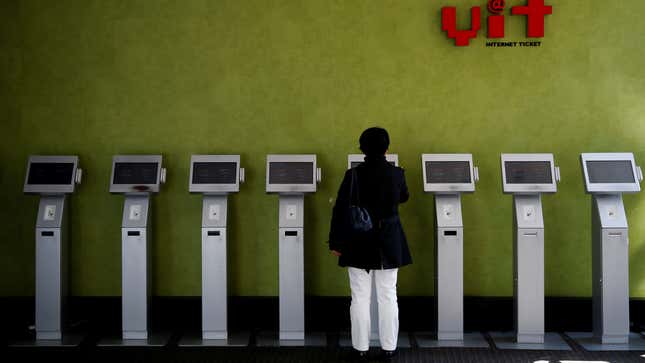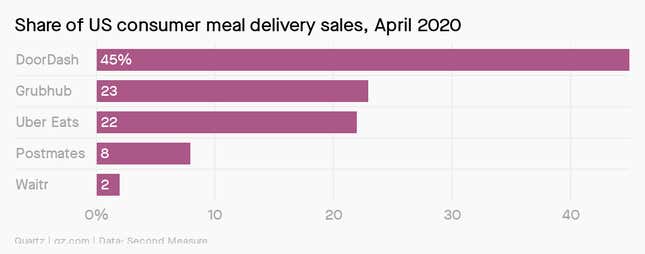Good morning, Quartz readers!
Here’s what you need to know
A new $250 billion stimulus effort from the US Federal Reserve launches. The Fed will be able to buy highly-rated corporate bonds from today, complementing its purchases of exchange-traded funds from last month. European markets appeared to be pleased with the news.
Donald Trump signs an executive order on police reform. There will be a database that tracks officers with multiple instances of misconduct, and mental health resources for officers. But the US president’s latest order doesn’t address claims of institutional racism.
India confirmed that three of its soldiers were killed on the border with China. “A violent face-off took place yesterday night with casualties on both sides,” an Indian army statement said. There has been no confirmation of China’s losses in the first fatal incident in the disputed region since 1975.
Major League Baseball stepped up the war with its players. MLB commissioner Rob Manfred told ESPN that a lack of “dialogue” with the players association is responsible for “the real risk” that a 2020 season might not take place.
Harvard College dropped standardized test requirements. The Ivy League school is changing its admissions requirements as it figures out how to attract the best applicants in a pandemic, and also after years of complaints that SATs penalize low-income students.
Slowing the red carpet’s roll

The Academy of Motion Picture Arts and Sciences—the folks who bring A-list celebrities together every year to show off the latest in formalwear and make tearful speeches—announced that they will be postponing the 2021 Oscars by two months, along with the eligibility deadline for feature films.
Though Japan has been a (relative) success story in rebounding from the Covid-19 pandemic, its box office has been extremely slow to follow suit, providing a glimpse of what bigger film markets like the US and India can expect as they reopen theaters with distancing policies in place.
In countries where the situation is much worse, moviegoers will have to be re-trained to return to the movies—a process that could be measured in years, not months.
Charting the food delivery sector
On June 10, Grubhub cut Uber out of a potential deal and agreed to merge with Just Eat Takeaway, a European food delivery service, in an all-stock purchase valued at $7.3 billion. Despite enormous industry growth even before the onset of the pandemic and its resulting lockdowns, the meal delivery business remains unstable. In the first quarter of 2020, Uber Eats recorded a $313 million loss in adjusted EBITDA.

It’s not exactly a heartening sign if your food delivery service is struggling during a time of unprecedented demand. When restaurants come back, the demand for Uber Eats and its competitors is likely to decline. With the industry increasingly saturated with unprofitable players, investors are hungry for more consolidation.
For Members: So you want to test a vaccine…
No problem! There’s just the small matter of redirecting all of your funds and energy. Here’s what you’d need to do to produce a mass vaccine trial at warp speed:
- Drop all other work
- Rustle up some in-house catering
- Pivot your research and restructure your entire organization
- Launch a massive phase one trial of human participants (which typically involves a few dozen participants, but in this case should include up to 1,050)
- Almost immediately start a combined phase two and three trial with more than 6,000 participants
- Support coronavirus trial sites in North America, Africa, and Asia, as well as in the UK
Your heroic efforts will make a great movie one day. Read more about how organizations like the Jenner Institute have taken on the Herculean task of fighting the novel coronavirus in our field guide on science’s great pandemic pivot.
✦ To gain access to all the stories, presentations, field guides, workshops, and more available exclusively to Quartz members, try a seven-day free trial. ✦
You asked about vaccine access
How will countries pay for vaccines? Will richer countries be prioritized?
Let’s talk about an advance market commitment, or AMC—essentially a fundraising pledge that gives contributors a share of the finished product. Katherine Ellen Foley wrote about Gavi, the Vaccine Alliance’s Covid-19 AMC, which has gotten pledges from the nation of Bhutan, the nonprofit group Gamers Without Borders, and TikTok. Gavi’s no stranger to vaccine AMCs, but this one’s drawn interest from a much more eclectic bunch.
“Why is something like an AMC necessary? It has to do with the way drug companies price vaccines,” Foley writes. “Drug prices are usually set to allow pharma companies to turn a profit after investing in research and development. But vaccines are different: In general, drug companies price vaccines based on what governments will pay for them. Predictably, this translates to wealthier countries paying more for vaccines, and poorer countries paying less. And unless something like an AMC puts an order in ahead of time, that means lower-paying countries can end up at the back of the queue.”
Production bottlenecks and direct contracts between governments and private vaccine producers all tend to jack up prices. Without AMCs and other mechanisms in place, poorer countries may be left without vaccines for their residents even after they’re on the market for the rest of the world.
Surprising discoveries
A Kentucky tattoo parlor is removing racist body art for free. “A lot of people when they were younger just didn’t know any better and were left with mistakes on their bodies.”
Want to take a fake holiday? Us neither, but you can do it in a Taiwanese airport.
A soccer star is taking on the UK government. Marcus Rashford is fighting for free meals for low-income kids.
Hummingbirds can see extra colors. They have more color-sensing cones than humans, meaning they can see beyond the rainbow spectrum.
A Quartz reader could win a set of Bose headphones. Just refer a friend to us.
Our best wishes for a productive day. Please send any news, comments, new colors, and a better tattoo to hi@qz.com. Get the most out of Quartz by downloading our app on iOS or Android and becoming a member. Today’s Daily Brief was brought to you by Hasit Shah, John Detrixhe, Katherine Ellen Foley, Adam Epstein, Michelle Cheng, Jackie Bischof, Susan Howson, and Nicolás Rivero.